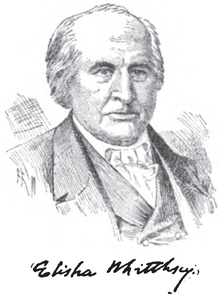Elisha Whittlesey
Elisha Whittlesey (born October 19, 1783 in Washington , Litchfield County , Connecticut , † January 7, 1863 in Washington, DC ) was an American politician . Between 1823 and 1838 he represented the state of Ohio in the US House of Representatives .
Career
Elisha Whittlesey was an uncle of William A. Whittlesey (1796-1866) and a cousin of Frederick Whittlesey (1799-1851) and Thomas T. Whittlesey (1798-1868), all three of whom were Congressmen. He moved to Salisbury in his youth . He later attended the public schools in Danbury . After studying law and admission to the bar, he began working in this profession in Danbury and then New Milford . In 1806 he moved his residence and law firm to Canfield , Ohio. There he also taught as a teacher. He was also a district attorney in Mahoning County there . During the British-American War he was both military and private secretary to General William Henry Harrison . At times he was also a major in the Army of the Northwest , as the part of the United States Army that operated in the Ohio area and other states in the region was called. Politically, he was initially a member of the Democratic Republican Party . He later moved to the National Republican Party , the Anti-Masonic Party, and finally the Whig Party . He was a member of the Ohio House of Representatives in 1820 and 1821 .
In the congressional elections of 1822 Whittlesey was elected in the then newly established 13th constituency of Ohio to the US House of Representatives in Washington, where he took up his new mandate on March 4, 1823. After seven re-elections, he could remain in Congress until his resignation on July 9, 1838 . From 1829 he was chairman of the Committee on Claims . Since 1833 he represented the 16th district of his state. The period from 1825 to 1829 was marked by heated discussions between the supporters of Andrew Jackson and those of President John Quincy Adams and Henry Clay , respectively . Since President Jackson took office in 1829, there has been heated debate inside and outside of Congress about its policies. It was about the controversial enforcement of the Indian Removal Act , the conflict with the state of South Carolina , which culminated in the nullification crisis , and the banking policy of the president.
Between 1841 and 1843 was Elisha Whittlesey auditor ( auditor ) in the US Treasury . Then he practiced again as a private lawyer. In 1847 he became General Agent of the Washington Monument Association , which campaigned for the construction of the Washington Monument in the federal capital. From 1849 to 1857 and again from 1861 until his death he was Comptroller of the Treasury in the Treasury. He died in Washington DC on January 7, 1863 and was buried in Canfield.
Web links
- Elisha Whittlesey in the Biographical Directory of the United States Congress (English)
| personal data | |
|---|---|
| SURNAME | Whittlesey, Elisha |
| BRIEF DESCRIPTION | American politician |
| DATE OF BIRTH | October 19, 1783 |
| PLACE OF BIRTH | Washington , Connecticut |
| DATE OF DEATH | January 7, 1863 |
| Place of death | Washington, DC |

